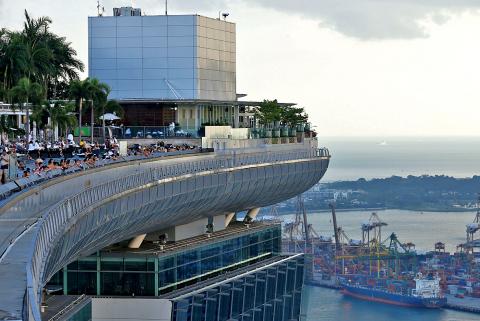Singapore exports surged last month on increased pharmaceutical and gold shipments, as traders seek a safe haven from market turmoil, but analysts yesterday warned the surprise jump did not indicate a wider economic recovery.
Non-oil domestic exports soared 11.6 percent year-on-year for the month, led by prefabricated buildings, pharmaceuticals and gold, trade promotion body International Enterprise (IE) Singapore said.
While Singapore does not have a large domestic market for the precious metal, it is a big regional player in the trade.

Photo: Reuters
Uncertainty in global markets — ranging from a slowdown in the Chinese economy to plunging crude prices — has pushed gold prices 20 percent higher in the last year.
“The increase in exports to Taiwan and India is also helped by a boost in gold trade. The global demand for gold is high as investors are seeking safe havens from the financial unrest in stocks and commodity markets,” CIMB Private Banking economist Song Seng Wun (宋城煥) said.
It was also the trade-reliant city-state’s best export performance since an 18.5 percent year-on-year jump in March last year.
IE Singapore said non-electronics shipments, including pharmaceuticals and petrochemicals, expanded by 19 percent, reversing the previous month’s 8.1 percent decline.
There was a notable surge in demand from the US and Taiwan, both major markets for Singapore.
Exports to the US grew 9.1 percent, while those to Taiwan leaped 11.2 percent last month.
However, analysts said last month’s figures could be an abnormality as there was little indication of a real turnaround in global economic fortunes.
“We hesitate to jump for joy and call for a turnaround in the exports outlook as this out-performance was really based on a few narrow segments, in particular gold,” United Overseas Bank wrote in a research note.
Song said the improved US figures came from an unusual boost in pharmaceutical shipments, while Taiwan received a bulk of Singapore’s prefabricated buildings in a one-time deal.
Meanwhile, there was a notable dip in demand from the EU and China.
Exports to the EU plunged 14 percent from the 20.6 percent growth it recorded in April, while shipments to China dropped 10.1 percent, worse than the 7.4 percent decline in April.
The government projects economic growth at 1 to 3 percent this year, but private sector economists expect it to come in at the lower end of the range. The economy grew 2 percent last year.

With an approval rating of just two percent, Peruvian President Dina Boluarte might be the world’s most unpopular leader, according to pollsters. Protests greeted her rise to power 29 months ago, and have marked her entire term — joined by assorted scandals, investigations, controversies and a surge in gang violence. The 63-year-old is the target of a dozen probes, including for her alleged failure to declare gifts of luxury jewels and watches, a scandal inevitably dubbed “Rolexgate.” She is also under the microscope for a two-week undeclared absence for nose surgery — which she insists was medical, not cosmetic — and is

CAUTIOUS RECOVERY: While the manufacturing sector returned to growth amid the US-China trade truce, firms remain wary as uncertainty clouds the outlook, the CIER said The local manufacturing sector returned to expansion last month, as the official purchasing managers’ index (PMI) rose 2.1 points to 51.0, driven by a temporary easing in US-China trade tensions, the Chung-Hua Institution for Economic Research (CIER, 中華經濟研究院) said yesterday. The PMI gauges the health of the manufacturing industry, with readings above 50 indicating expansion and those below 50 signaling contraction. “Firms are not as pessimistic as they were in April, but they remain far from optimistic,” CIER president Lien Hsien-ming (連賢明) said at a news conference. The full impact of US tariff decisions is unlikely to become clear until later this month

GROWING CONCERN: Some senior Trump administration officials opposed the UAE expansion over fears that another TSMC project could jeopardize its US investment Taiwan Semiconductor Manufacturing Co (TSMC, 台積電) is evaluating building an advanced production facility in the United Arab Emirates (UAE) and has discussed the possibility with officials in US President Donald Trump’s administration, people familiar with the matter said, in a potentially major bet on the Middle East that would only come to fruition with Washington’s approval. The company has had multiple meetings in the past few months with US Special Envoy to the Middle East Steve Witkoff and officials from MGX, an influential investment vehicle overseen by the UAE president’s brother, the people said. The conversations are a continuation of talks that

CHIP DUTIES: TSMC said it voiced its concerns to Washington about tariffs, telling the US commerce department that it wants ‘fair treatment’ to protect its competitiveness Taiwan Semiconductor Manufacturing Co (TSMC, 台積電) yesterday reiterated robust business prospects for this year as strong artificial intelligence (AI) chip demand from Nvidia Corp and other customers would absorb the impacts of US tariffs. “The impact of tariffs would be indirect, as the custom tax is the importers’ responsibility, not the exporters,” TSMC chairman and chief executive officer C.C. Wei (魏哲家) said at the chipmaker’s annual shareholders’ meeting in Hsinchu City. TSMC’s business could be affected if people become reluctant to buy electronics due to inflated prices, Wei said. In addition, the chipmaker has voiced its concern to the US Department of Commerce